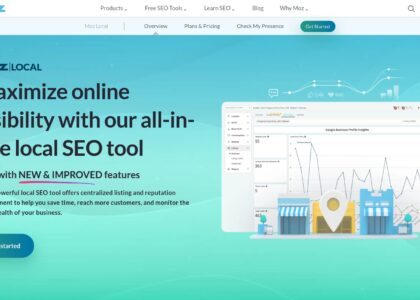Innovative Software Solutions: Transforming the Digital Landscape
In today’s fast-paced digital world, businesses are constantly seeking ways to enhance efficiency, improve customer experiences, and gain a competitive edge. Innovative software solutions have emerged as a critical component in achieving these objectives. By leveraging cutting-edge technologies such as artificial intelligence (AI), machine learning, and cloud computing, companies can transform their operations and drive growth.
The Role of Innovation in Software Development
Innovation in software development is not just about creating new applications; it’s about finding creative ways to solve existing problems and anticipate future needs. This involves rethinking traditional processes, embracing new technologies, and fostering a culture of continuous improvement.
One of the key drivers of innovation is the integration of AI into software solutions. AI enables systems to learn from data, adapt to changing conditions, and make intelligent decisions. This capability is revolutionising industries ranging from healthcare to finance by automating tasks, providing insights through data analysis, and enhancing user interactions.
Cloud Computing: The Backbone of Modern Solutions
Cloud computing has become the backbone of modern software solutions. It offers unparalleled flexibility, scalability, and cost-effectiveness. By hosting applications in the cloud, businesses can access their systems anytime and anywhere, facilitating remote work and global collaboration.
The cloud also supports innovative models like Software as a Service (SaaS), which allows companies to use applications on a subscription basis without worrying about infrastructure maintenance. This model not only reduces costs but also ensures that businesses always have access to the latest features and updates.
User-Centric Design: Putting People First
An essential aspect of innovative software solutions is user-centric design. This approach prioritises the needs and preferences of end-users throughout the development process. By focusing on usability and user experience (UX), developers can create intuitive interfaces that enhance productivity and satisfaction.
User feedback plays a crucial role in this process. By actively seeking input from users during development stages, companies can make informed decisions that lead to more effective solutions tailored to real-world requirements.
The Future of Innovative Software Solutions
The future of innovative software solutions lies in continued advancements in technology coupled with an emphasis on sustainability and ethics. As businesses increasingly rely on digital tools for their operations, there will be a growing demand for environmentally friendly practices within the tech industry.
Moreover, ethical considerations such as data privacy will become even more critical as AI-driven applications handle sensitive information. Companies must ensure transparency in how they collect and use data while adhering to regulatory standards like GDPR.
Conclusion
Innovative software solutions are at the forefront of transforming business landscapes across various sectors by enhancing efficiency through AI integration or enabling seamless global collaboration via cloud computing platforms like SaaS models among others; all while keeping user-centric design principles top priority ensuring maximum productivity & satisfaction levels achieved consistently over time! As we look forward into what lies ahead within this rapidly evolving field full potential awaits discovery if approached ethically responsibly sustainably ensuring long-term success both organisationally individually alike!
Nine Advantages of Innovative Software Solutions for Modern Businesses
- Enhance operational efficiency
- Improve customer experiences
- Drive business growth
- Enable automation of repetitive tasks
- Provide valuable insights through data analysis
- Facilitate remote work and collaboration
- Increase scalability and flexibility
- Enhance decision-making with AI capabilities
- Stay competitive in a rapidly evolving digital landscape
Challenges of Implementing Innovative Software Solutions: Key Considerations for Businesses
- High initial investment required for developing and implementing innovative software solutions.
- Complexity in integrating new technologies with existing systems may lead to compatibility issues.
- Potential for disruptions in business operations during the transition to innovative software solutions.
- Dependence on external vendors or experts for maintenance and support of advanced software technologies.
- Security vulnerabilities and data privacy concerns associated with cutting-edge software solutions.
- Risk of technical glitches or bugs affecting the performance and reliability of innovative software.
Enhance operational efficiency
Innovative software solutions significantly enhance operational efficiency by streamlining processes and automating routine tasks. By leveraging advanced technologies such as artificial intelligence and machine learning, these solutions can analyse vast amounts of data quickly and accurately, providing actionable insights that enable businesses to make informed decisions. Automation reduces the need for manual intervention, minimising errors and freeing up valuable human resources to focus on more strategic activities. Additionally, real-time monitoring and reporting capabilities allow organisations to track performance metrics closely, identify bottlenecks, and implement improvements swiftly. As a result, companies can operate more smoothly, reduce costs, and increase productivity, ultimately gaining a competitive edge in their respective industries.
Improve customer experiences
Innovative software solutions significantly enhance customer experiences by providing personalised, efficient, and seamless interactions. Through the use of advanced technologies such as artificial intelligence and data analytics, businesses can gain deeper insights into customer preferences and behaviours. This allows them to tailor their services and products to meet individual needs more accurately. Additionally, features such as chatbots and automated support systems ensure that customers receive immediate assistance, reducing wait times and improving satisfaction. By streamlining processes and offering intuitive interfaces, these solutions make interactions more user-friendly and engaging, ultimately fostering stronger customer loyalty and trust.
Drive business growth
Innovative software solutions are pivotal in driving business growth by streamlining operations, enhancing productivity, and opening new avenues for revenue generation. By automating routine tasks, these solutions free up valuable time and resources, allowing businesses to focus on strategic initiatives and innovation. Additionally, advanced data analytics provide insights into customer behaviour and market trends, enabling companies to make informed decisions that boost competitiveness. Furthermore, the adoption of cloud-based platforms facilitates scalability, ensuring businesses can swiftly adapt to changing demands without significant infrastructure investments. This agility not only improves operational efficiency but also positions businesses to seize emerging opportunities in the marketplace.
Enable automation of repetitive tasks
One significant advantage of innovative software solutions is their ability to enable the automation of repetitive tasks. By leveraging technologies such as artificial intelligence and machine learning, businesses can streamline their operations by automating routine processes that would otherwise require manual intervention. This not only saves time and reduces the risk of human error but also allows employees to focus on more strategic and creative tasks, ultimately increasing productivity and efficiency across the organisation.
Provide valuable insights through data analysis
Innovative software solutions offer a significant advantage by providing valuable insights through advanced data analysis. By leveraging technologies such as artificial intelligence and machine learning, businesses can extract meaningful patterns and trends from vast amounts of data. These insights enable informed decision-making, improve operational efficiency, and identify new opportunities for growth. With the ability to process data at scale and in real-time, organisations can gain a competitive edge by understanding their customers better, predicting market trends, and optimising their strategies based on actionable intelligence derived from data analysis.
Facilitate remote work and collaboration
Innovative software solutions play a crucial role in facilitating remote work and collaboration by providing seamless connectivity and communication tools that transcend geographical boundaries. Through cloud-based platforms and digital collaboration tools, employees can collaborate in real-time, access shared documents, and communicate effortlessly regardless of their physical location. This flexibility not only enhances productivity but also enables businesses to tap into a global talent pool, fostering diversity and creativity within teams.
Increase scalability and flexibility
One significant advantage of innovative software solutions is their ability to increase scalability and flexibility within businesses. By leveraging cutting-edge technologies such as cloud computing and AI, organisations can easily adapt to changing demands and scale their operations as needed. This enhanced scalability enables businesses to grow without being limited by traditional infrastructure constraints, while the flexibility provided by innovative software solutions allows for agile responses to market dynamics and customer requirements. Ultimately, this pro of innovative software solutions empowers businesses to remain competitive and responsive in today’s fast-paced digital landscape.
Enhance decision-making with AI capabilities
Innovative software solutions equipped with AI capabilities significantly enhance decision-making processes within organisations. By analysing vast amounts of data quickly and accurately, AI can uncover patterns and insights that might be missed by human analysis alone. This enables businesses to make informed decisions based on real-time data, improving strategic planning and operational efficiency. Furthermore, AI-driven predictive analytics can forecast future trends and outcomes, allowing companies to anticipate changes in the market and adjust their strategies accordingly. As a result, organisations can respond more swiftly to emerging opportunities and challenges, maintaining a competitive edge in their respective industries.
Stay competitive in a rapidly evolving digital landscape
Innovative software solutions offer businesses the opportunity to stay competitive in a rapidly evolving digital landscape by providing tools and technologies that enable them to adapt quickly to changing market dynamics. By embracing cutting-edge software, companies can streamline their operations, enhance customer experiences, and gain insights through data analytics that give them a strategic advantage. This proactive approach not only helps businesses keep pace with industry trends but also positions them as leaders in their respective fields, ensuring long-term success and sustainability in an increasingly digital-driven world.
High initial investment required for developing and implementing innovative software solutions.
One significant drawback of innovative software solutions is the high initial investment required for their development and implementation. The integration of cutting-edge technologies such as AI, machine learning, and cloud computing demands substantial financial resources upfront. Companies may need to allocate significant budgets towards hiring skilled professionals, acquiring necessary tools and infrastructure, and conducting extensive research and development. This financial commitment can be a barrier for smaller businesses or startups looking to adopt innovative software solutions, potentially limiting their ability to compete effectively in the digital market space.
Complexity in integrating new technologies with existing systems may lead to compatibility issues.
Integrating new technologies with existing systems can present significant challenges, particularly when it comes to compatibility issues. As businesses strive to adopt innovative software solutions, they often encounter difficulties in ensuring seamless integration with their current infrastructure. This complexity arises from differences in software architectures, data formats, and communication protocols. Incompatibilities can lead to disruptions in business operations, increased costs for additional development or customisation, and the need for specialised expertise to resolve integration hurdles. Consequently, while innovative solutions promise enhanced capabilities and efficiencies, the path to achieving these benefits may involve navigating a complex landscape of technical obstacles.
Potential for disruptions in business operations during the transition to innovative software solutions.
During the transition to innovative software solutions, businesses may encounter disruptions in their operations. Implementing new technologies often requires adjustments to existing processes, workflows, and employee roles. This period of transition can lead to temporary slowdowns in productivity as employees adapt to the new systems and undergo training. Moreover, technical issues or compatibility challenges between old and new software can cause unexpected downtime, impacting business continuity. It is essential for organisations to carefully plan and manage the transition process to minimise disruptions and ensure a smooth integration of innovative software solutions into their operations.
Dependence on external vendors or experts for maintenance and support of advanced software technologies.
A significant drawback of innovative software solutions is the reliance on external vendors or experts for maintenance and support of advanced technologies. While these experts bring valuable expertise and specialised knowledge to the table, businesses may face challenges such as increased costs, longer response times, and potential security risks associated with granting third-party access to sensitive systems. Dependence on external vendors can also lead to a lack of in-house skills development, limiting the organisation’s ability to independently manage and troubleshoot software issues effectively. This reliance introduces a level of uncertainty and dependency that can hinder agility and control over critical software systems.
Security vulnerabilities and data privacy concerns associated with cutting-edge software solutions.
While innovative software solutions offer numerous benefits, they also present significant security vulnerabilities and data privacy concerns. As these cutting-edge technologies become more complex and interconnected, they create additional entry points for cyber threats. Hackers can exploit these vulnerabilities to gain unauthorised access to sensitive information, leading to data breaches that compromise personal and organisational data. Furthermore, the integration of advanced technologies such as artificial intelligence and cloud computing often involves handling large volumes of data, raising concerns about how this information is collected, stored, and used. Ensuring robust security measures and compliance with data protection regulations is crucial to safeguarding privacy in this rapidly evolving digital landscape.
Risk of technical glitches or bugs affecting the performance and reliability of innovative software.
While innovative software solutions offer numerous benefits, they also come with the inherent risk of technical glitches or bugs that can affect performance and reliability. These issues can arise from the complexity of new technologies and the rapid pace of development, which may lead to insufficient testing or unforeseen interactions within the software. Such glitches can disrupt business operations, lead to data loss, and damage user trust. To mitigate these risks, it is crucial for companies to invest in comprehensive testing and quality assurance processes, as well as implement robust support systems to address any issues swiftly and efficiently.






